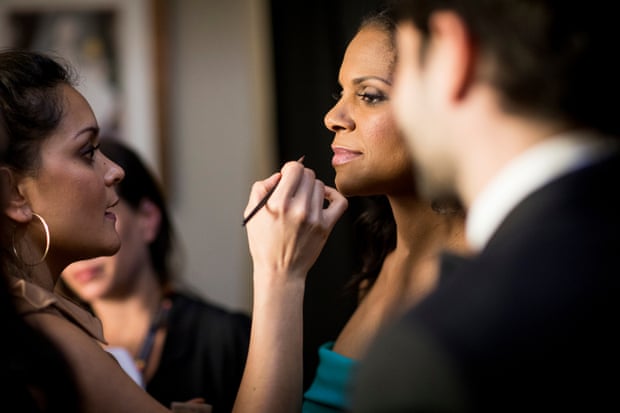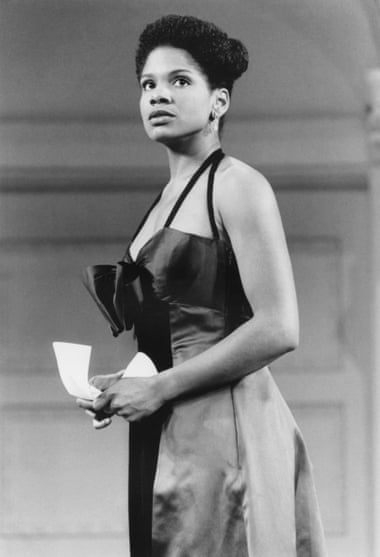“I’m trying to get to the truth of why I’m singing this song,” says Audra McDonald, the stage and television star who has won more Tony awards than any other performer. Speaking on a video call from her home near New York City, McDonald is dressed down – with horn-rimmed glasses and a polka-dot head scarf – but later this month she will dress up to front a 40-person orchestra at the London Palladium, singing selections from “the American songbook”.
What that constitutes can be a vexed question. (Answers usually involve white men, Duke Ellington excepted.) What it means to be American and to represent American culture, these are tough ones, too. But McDonald, 52, has enlarged the notion of what that songbook can sound like, what American excellence can look like. As a Black woman commanding stages that have not always welcomed Black women, she delivers these songs with an open heart and expansive soprano, transmuting midcentury classics into something fresh. “A specific song changes through my vessel,” she says.
One example is Being Good Isn’t Good Enough, first performed by Leslie Uggams. The song acquired new resonance for McDonald during the confirmation hearings for Ketanji Brown Jackson, the first Black woman to join the US supreme court.
She quotes a few of the song’s lyrics: “When I fly, I must fly extra high / And I’ll need special wings so far to go / From so far below.” Then she offers her particular interpretation. “People of colour, we were raised with this message of you have to be twice as good to get half as far,” McDonald says. “So I started singing that song so that I could then speak about that.”
McDonald is very good and she has gotten very far. Farther than anyone currently working, maybe. For three decades, she has been a symbol of change on Broadway. More recently, she has crusaded for it. Her talent has solidified efforts toward colour-blind and colour-conscious casting and theatre diversity. “Change is never as fast as we want,” she says. “But there has been change. And in the past two years, I’ve seen a lot of effort to change quicker and be more substantive with the change.”
The television roles she has chosen push for change, too. She currently stars on both The Good Fight, in its sixth and final season, and The Gilded Age. In the former, she plays Liz, a lawyer at a leading Black firm, and she has found playing the character and the show’s handling of race, gender and power, cathartic. “Those real prickly, complicated but necessary conversations were wonderful to have,” she says. Her role on The Gilded Age is smaller, but allows her to portray a member of the thriving Black bourgeoisie that existed in 19th-century New York.
She doesn’t perceive her concerts as explicitly political, at least not in the most direct sense. But she believes, fervently, that we can better ourselves and our shared world by recognising one another’s humanity. “I want a concert to feel like I’m in my living room with people,” she says. “We’re going to have a communion of sorts, and within that communion you are going to become more human to me, I’m going to become more human to you. I’m not walking in there and telling you who to vote for. I’m walking in there and telling you what’s important to me.”

For this concert, she has widened the traditional songbook to include more numbers by women and people of colour. She has also included traditional songs that she never before felt she had the authority to sing (she mentions Sondheim’s Being Alive) or songs that she believed were too joined to one particular performer (Kander and Ebb’s Cabaret, for example). Earlier in her career, she used to beat herself up for not singing perfectly. But she has gained in confidence and songs like these, selected with the help of her music director, Andy Einhorn, now feel in her grasp.
She has learned to trust herself, in ways that bring to mind lyrics from Move On, a song from Sondheim’s Sunday in the Park with George: “Anything you do / Let it come from you / Then it will be new.” McDonald explains it a little differently. “I’m finding the why,” she says. “I have to have a need to sing the song, it needs to be something I’m going to figure out, discover, get off of my chest. I’ve got to know that I’m going to be in a different place emotionally or just even sometimes physically by the end of a song than when I started. There has to be a why and if there is a why, I can go all the way deep down into my truth and sing it and not worry about what it sounds like. All that gets taken care of because I am living in the why.”

